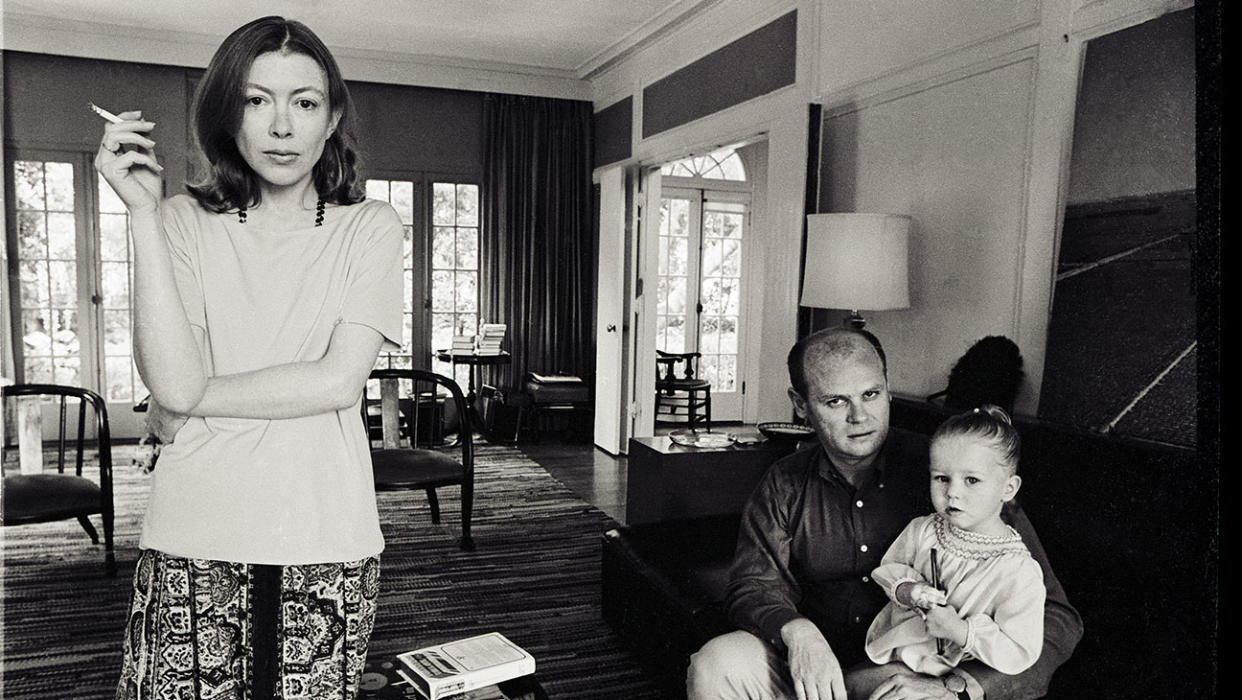Joan Didion is icy-cool in a new documentary about her life

Writers don’t get much cooler than Joan Didion, the novelist and essayist whose icy gaze and chilly prose style made her rich and famous, even as she seemed to reject so much of the world. Her essays deploy an intentionally flat, declarative prose to make sharp-eyed observations; her novels are minimalist fictions with alienated protagonists searching, always at the end of their existential ropes, for some small comfort that rarely arrives.
Now 82, Didion is the subject of an elegantly bare-bones documentary called Joan Didion: The Center Will Not Hold, streaming starting Friday on Netflix, and directed by actor Griffin Dunne — Didion’s nephew. The title is a phrase from W.B. Yeats’s poem “The Second Coming” and was used by Didion in one of her career-making essays, 1967’s “Slouching Toward Bethlehem,” which cast a highly skeptical gaze upon the hippie counterculture of that era. While all those around her in the media were going gaga over the supposedly utopian visions of the flower-power generation, Didion went to San Francisco’s Haight-Ashbury neighborhood, ground zero for the movement, and came away describing desperation, drug addiction, and filth. She was used to observing drugs and desperation on a higher plane as a Hollywood insider, and so for Didion — never a beatnik, always a neat-nik — it was the grime and chaos that she really found off-putting.
Didion discovered a superficially unlikely but deeply complementary life partner in her husband, the writer John Gregory Dunne. Like Didion, he moved between fiction and nonfiction; unlike Didion, he was far from cool: He was a feisty hothead who encouraged his own treasured Irish heritage — he was all about telling stories and settling scores. Together, Didion and Dunne settled in Los Angeles and began making millions writing screenplays, most of them for bad movies such as the Barbra Streisand remake of A Star Is Born and a mediocre version of Didion’s bestselling novel Play It As It Lays, which even the perfectly frosty presence of star Tuesday Weld could not save. The screenplays financed the book work they really valued; the Hollywood connections supplied the status and glittering social life they only pretended to scorn.
Dunne uses his familial connection to Didion to visit the now 82-year-old author in her Manhattan apartment, drawing her out as much as any interviewer has been able to. Didion has always been notoriously reluctant to analyze her work or give up juicy anecdotes. The film is, inevitably, nearly as much about John Gregory Dunne as it is about Didion. Dunne was by far the more outgoing of the two — he was the networker and the power player who delighted in playing the game of Hollywood career-making and gathering bits of gossip with which to amuse his wife. The two adopted a daughter, whom they named Quintana Roo; Didion shows rare warmth in her descriptions of motherhood, which makes Quintana’s premature death in 2005 at age 39 all the more wounding.
The film, which is also co-produced by Didion’s grandniece Annabelle Dunne, features interviews with Didion admirers ranging from Robert Silvers (the New York Review of Books editor who gave Didion many assignments, and who died just this past March) to Harrison Ford, who was hired by Didion and Dunne in his hard-scrabbling handyman days. Ford was an employee who became a friend and was invited to the posh Didion-Dunne parties, where, he says here, he felt stupid.
The Center Will Not Hold has a brisk, no-frills pace and editing. Almost inadvertently, Griffin Dunne’s film reveals Didion as an essentially conservative mind, someone who prized order, tradition, and power structures. (Not for nothing does this very strong woman never use the word “feminism.”) As the years go by, Didion’s fiction now seems less significant than her nonfiction, and I wonder whether, in a few decades more, all of her work may matter less to the culture than her icy-cool image, which has already been fetishized in the 2015 ad campaign for the fashion line Celine. If you’re not the sort of person who’s diving for your remote to start binge-watching Stranger Things 2, you might well be the sort of person who’ll want to spend a quietly intense hour and a half pondering the life of Joan Didion.
Joan Didion: The Center Will Not Hold is streaming now on Netflix.
Read more from Yahoo Entertainment:


